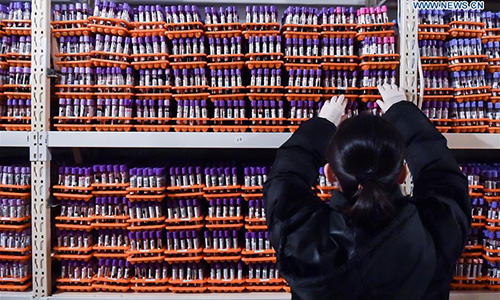
A staff member places the blood samples at the China National GeneBank (CNGB) in Shenzhen, South China's Guangdong Province, Sept. 20, 2016. The CNGB was officially opened Thursday, aiming to promote human health research and the conservation of global bio-diversity. (Photo: Xinhua)
A deputy to the National People's Congress (NPC) called for laws to better protect Chinese people's biological information.
"Personal biological information is unique and non-modifiable…It is at special risk for its sensitivity and value that are much more valuable than ordinary information," Yi Tong, who is also an associate director of the Beijing Research Center for Science of Science, was qouted as saying by the Science and Technology Daily in a report on Wednesday.
Along with the rapid improvement of biotechnology, acquiring, gathering, saving and applying personal biological information, including fingerprints, irises, visages and DNA, are more convenient and common. However, bugs during the process would bring enormous risks to the safety of personal information, the safety of citizens' lives and property, and even social governance, Yi noted.
Yin pointed out the absence of law to protect personal biological information in China.
"To avoid the negative effects caused by the law lag on the development of technology, (I) suggest China should plan legislation and conduct research to build and complete a personal biological information protection system in line with China's domestic conditions," Yi said.
It is also imperative to identify the non-commercial applications of personal biological information in criminal investigation, security administration, population governance and health care, as well as the responsibilities of related authorities and agencies, particularly the limits of personal biological information protection rights, Yi noted.
China still lacks regulations and mechanism to deal with tort risks and unfair competition in the commercial application of personal biological information and relevant industries, Yi pointed out.
The China National GeneBank in Shenzhen, South China's Guangdong Province, officially opened in September 2016 to promote human health research and the conservation of global bio-diversity, the Xinhua News Agency reported.
Covering an area of over 47,500 square meters, the gene bank has saved more than 10 million bio-samples and established cooperation and research with over 100 organizations in areas such as human health, bio-diversity, and biological evolution, according to Xinhua.
The bank is "projected to be the world's largest comprehensive gene bank," boasting the world's largest storage capacity and most accessible data and samples, the public relations department of Chinese gene research giant BGI told the Global Times in a previous interview.


